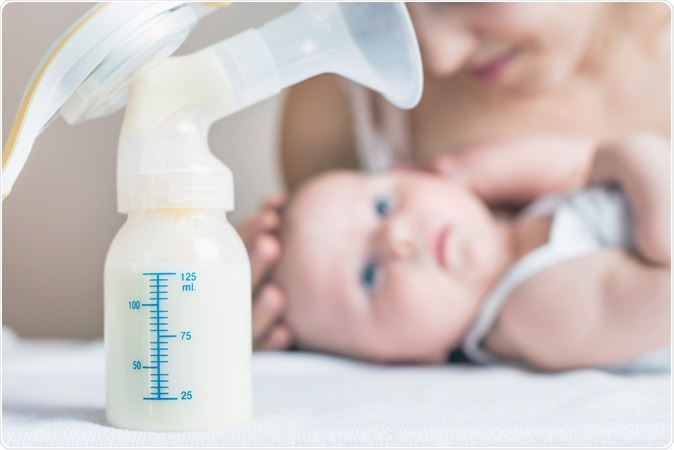Mothers across the world use breast pumps to pump put the milk that is fed to their babies. A new study has revealed that these pumps may not be safe and may be contaminated with bacteria that can cause asthma in the babies later in life. The results of this study were published in the latest issue of the journal Cell Host & Microbe.

Manual breast pump. Image Credit: Pavel Ilyukhin / Shutterstock
Researchers from University of Manitoba, Canada compared babies who had been fed breast milk via a pump to babies who were directly breastfed. Results showed that babies who were being directly breastfed had a rich diversity of bacteria in their mouths called the microbiome. This microbiome in the gut and mouth can be beneficial for a baby’s health and immunity, the researchers explain. On the other hand babies that were fed via breast pump had harmful bacteria in their mouths that led to an increased risk of their getting asthma later in life. The bacterial genes from breast milks of 393 healthy mothers were analyzed. These mothers had delivered three or four months before they were included in the study. The mothers and babies were part of the Canadian Healthy Infant Longitudinal Development (CHILD) study. The mothers were being tracked from their pregnancy till their babies attained adolescence as part of the longitudinal study.
The researchers led by Dr Shirin Moossavi, a PhD student studying medical microbiology, explain these findings by saying that when directly breastfed, the babies take up good bacteria from their mother’s nipples. On the other hand harmful bacteria thrive within the breast pumps and can be picked up by the babies when they use the bottles where the pumped milk is stored.
The authors of the study write, “Although previously considered sterile, breast milk is now known to contain a complex community of bacteria that helps establish the infant gut microbiota... If this process is disrupted, the infant may develop a dysbiotic microbiota, causing predisposition to chronic diseases such as allergy, asthma and obesity.”
Results showed that milk given via breast pumps were found to contain high numbers of harmful bacteria known as “opportunistic pathogens” including Stenotrophomonas and Pseudomonadaceae. Opportunistic pathogens are those that can lead to infections when the host immunity is low. In normal conditions these may be harmless otherwise. Stenotrophomonas bacteria for example can lead to infections of the respiratory tract, urinary tract or bloodstream. Pseudomonadaceae species on the other hand is known to cause wound infections. Authors explain that respiratory tract infections can lead to repeated inflammation of the lungs and airways and this can lead to an increased risk of asthma later in life.
On the other hand breast milk that was directly fed to the babies did not contain these bacteria. The mouths of breast fed babies were found to be rich in diverse helpful bacteria. Common among these was the Bifidobacterium species. These bacteria help in digestion and also reduce the risk of infections, the authors wrote. They add, “Gut microbiota is crucial in the development and education of the infant immune system. And disruption of gut microbiota in the first few months of life is associated with atopy and asthma later in childhood.”
Dr Shirin Moossavi in a statement said, “Increased exposure to potential pathogens in breast milk could pose a risk of respiratory infection in the infant, potentially explaining why infants fed pumped milk are at increased risk for paediatric asthma compared to those fed exclusively at the breast.” Senior author Dr Meghan Azad, from the Children's Hospital Research Institute of Manitoba, in a statement added, “This study considerably expands our understanding of the human milk microbiota and the factors that might influence it. The results will inspire new research about breastfeeding and human milk, especially related to pumping.” She called this “one of the largest ever studies of the milk microbiome.”
The researchers warn that more study and understanding is needed before mothers stop feeding their babies pumped milk. “We need to understand the differences that happen after milk is expressed and stored,” Azad said. “It’s not like pumped milk is awful, and it’s still very different than formula,” she explained. Azad said. “It’s important to know the differences so we can ask why, and figure out what to do to address any deficit.”
Source: https://www.cell.com/cell-host-microbe/fulltext/S1931-3128(19)30049-6